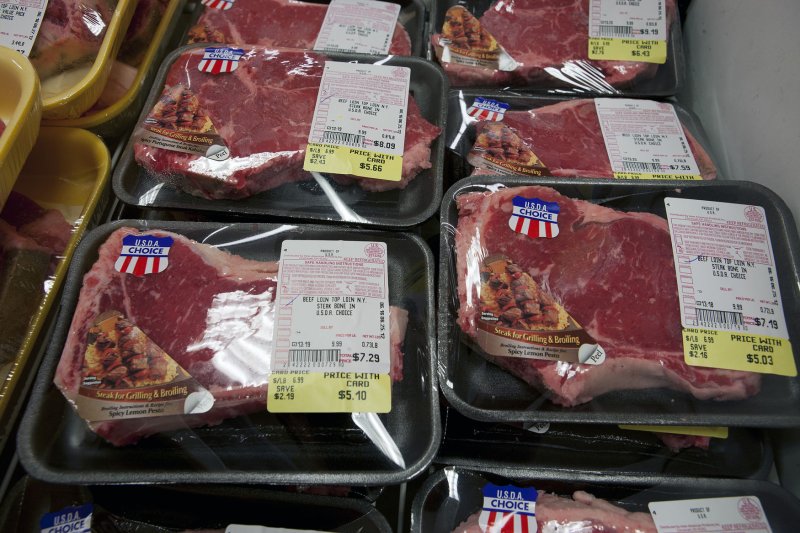New York strips on sale at the King Soopers supermarket in Lakewood, Colorado on June 20, 2012. This week, an investment research organization said taxes on meat could soon be imposed by governments to reduce climate change. File Photo by Gary C. Caskey/UPI |
License Photo
Dec. 12 (UPI) -- Additional taxes could soon be imposed on meat products in an effort to combat climate change and obesity, according to research published Monday.
The Farm Animal Investment Risk and Return, an investor initiative that aims to bring awareness of the factory farming industry's impact on the environment and society, said that governments might soon begin imposing taxes on meat to curb those effects.
FAIRR said global meat consumption is on the rise, which is igniting governmental concerns over carbon emissions from transport; rising rates of obesity and type 2 diabetes; increased levels of antibiotic resistance; threats to water security; and soil degradation and deforestation.
"Meat taxes are already on the agenda in Denmark, Sweden and Germany, and although no proposals have advanced into actual legislation, long-term investors should take note of the compelling arguments being made, especially in Denmark and Sweden," the report states.
Levying a tax on meat would be similar to how countries have adopted taxes on carbon, tobacco and sugar.
"It was in the Nordics that the first carbon tax was introduced in 1990," FAIRR said.
Today, 60 countries have a carbon tax, 180 impose a tobacco tax and 25 charge a sugar tax.
And with countries looking to meet demands set forth by the Paris Agreement, a meat tax could be invevitable.
"As implementation of the Paris climate agreement progresses we're highly likely to see government action to reduce the environmental impact of the global livestock sector," Maria Lettini, director of FAIRR, told the Guardian. "On the current pathway we may well see some form of meat tax emerge within five to 10 years."
In November, an Oxford University team conducted a study and concluded that adding a 40 percent tax on meat and a 20 percent tax on milk would pay for the environmental and health damage believed to be caused by the meat and dairy industries.















